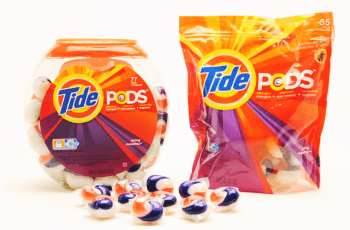As a nutritional psychiatrist, I understand the importance of a healthy diet for our overall well-being, including the health of our memory and cognition. Certain foods can have a negative impact on our memory function, leading to memory impairments and cognitive decline. It is vital to be aware of these memory-damaging food choices and avoid them as much as possible. In this article, I will share with you the 5 worst foods for memory that you should stay away from for optimal memory health.
Unhealthy eating habits and a diet that promotes inflammation in the brain can contribute to memory deterioration over time. By making conscious choices about what we eat, we can support our brain health and enhance our memory and cognition.
Key Takeaways:
- Industrial and processed seed oils, added and refined sugars, processed foods, foods with artificial sweeteners, and fried foods are the 5 worst foods for memory.
- These foods can lead to inflammation in the brain, memory impairments, shorter telomeres, negative effects on gut bacteria, and lower scores of memory and cognition.
- Avoiding these foods and opting for healthier alternatives like olive, coconut, or avocado oil, homemade items made with whole foods, and natural sweeteners can support better memory and brain health.
- Trans fats, high sugar and refined carbohydrates, and highly processed foods should also be avoided to minimize the detrimental effects on memory and cognitive function.
- By making mindful food choices, we can protect and enhance our memory, supporting a healthy brain and overall well-being.
Industrial and Processed Seed Oils
Industrial and processed seed oils, such as soybean, corn, rapeseed, cottonseed, sunflower, and safflower oils, are commonly used in cooking and food manufacturing. These oils are rich in omega-6 fatty acids, which play a crucial role in our diet. However, consuming these oils in excess can have negative effects on brain health.
Research has shown that a high intake of omega-6 fatty acids from industrial and processed seed oils can lead to inflammation in the brain. This inflammation is believed to be a contributor to memory impairments and cognitive decline.
Dr. Uma Naidoo, a nutritional psychiatrist, advises using healthier alternatives like olive, coconut, or avocado oil for cooking instead. These oils are lower in omega-6 fatty acids and offer additional health benefits.
Added and Refined Sugars
Foods with added and refined sugars have become a common part of many people’s diets. From sugary drinks to store-bought pasta sauces and canned soups, these sources of added sugar can have a significant impact on our brain health. Consuming these foods can lead to excess glucose in the brain, which can have detrimental effects on our memory and cognitive function.
Excess glucose in the brain can disrupt the delicate balance necessary for optimal brain function. It can impair memory and decrease the plasticity of the hippocampus, the region of the brain responsible for memory control and formation. When the plasticity of the hippocampus is compromised, our ability to retain and recall information may be affected.
Dr. Uma Naidoo, a nutritional psychiatrist, advises opting for homemade items made with whole foods as alternatives to sugary options. By preparing meals and drinks at home, we can have better control over the amount of added sugars in our diet. Choosing whole foods not only helps to reduce the intake of added and refined sugars but also provides essential nutrients that support brain health.
The Link Between Added Sugars and Memory Impairments
Research has shown that excess consumption of added and refined sugars can have a negative impact on memory and cognitive function. The presence of high levels of glucose in the brain can impair synaptic activity and interfere with the communication between brain cells. This, in turn, can lead to memory impairments and difficulties in learning and retaining information.
Furthermore, the plasticity of the hippocampus plays a crucial role in our ability to form new memories and adapt to new information. When the plasticity of the hippocampus is compromised, such as by the excess glucose caused by added sugars, our brain’s ability to create and store memories can be hindered.
While occasional indulgence in sweet treats is unlikely to cause long-term harm, it is important to be mindful of our overall sugar intake and make healthier choices whenever possible. By reducing our consumption of added and refined sugars, we can support our brain health and contribute to better memory function.
Processed Foods
Processed foods have become a staple in our modern diets, but they may be compromising our health in more ways than one. Consuming a diet high in processed foods can have detrimental effects on our cellular health and overall well-being.
One concerning aspect of processed foods is their potential to cause shorter telomeres, which are protective caps at the ends of our chromosomes. Telomeres naturally shorten as we age, but certain lifestyle factors, including diet, can accelerate this process. Research has shown that a diet rich in processed foods can lead to shorter telomeres, which are associated with an increased risk of degenerative diseases and premature aging.
Furthermore, the consumption of high amounts of ultra-processed foods has been linked to the development of mild depression. These ultra-processed foods, such as sugary baked goods and carbonated sodas, are often loaded with unhealthy additives and lack essential nutrients. The combination of high sugar content, artificial ingredients, and unhealthy fats can negatively affect our mood and overall mental well-being.
To protect our cellular health and promote optimal well-being, it is advised to limit our intake of processed foods. This includes avoiding packaged snacks, sugary beverages, and foods with ingredients that we can’t pronounce or identify. Instead, focusing on whole, unprocessed foods like fruits, vegetables, lean proteins, and whole grains can support our physical and mental health.

Remember, the choices we make about what we put into our bodies can have a significant impact on our overall health and well-being. By prioritizing whole, unprocessed foods, we can support our cellular health, reduce the risk of degenerative diseases, and improve our mental and emotional well-being.
Foods with Artificial Sweeteners
Artificial sweeteners like saccharin, sucralose, and aspartame are commonly found in various food products marketed as low-calorie or sugar-free alternatives. While they may seem like a healthier choice, consuming foods with artificial sweeteners can have negative effects on gut health, mood, and cognitive function.
Studies have suggested that artificial sweeteners can disrupt the balance of “good” and “bad” gut bacteria, leading to an overgrowth of harmful bacteria in the gut. This imbalance can contribute to digestive issues and affect overall well-being. Additionally, research has found a direct link between aspartame consumption and increased anxiety levels.
Furthermore, artificial sweeteners can cause oxidation in the brain, leading to the production of harmful free radicals. These free radicals can contribute to oxidative stress, which is associated with various health problems, including cognitive decline.
Instead of relying on artificial sweeteners, consider using natural alternatives like honey, monk fruit extract, or coconut sugar. These options provide sweetness without the potential negative effects on gut health and brain function.
Fried Foods
Consuming foods that are battered, crusted, or deep-fried can be damaging to the brain and may lead to lower scores of memory and cognition. Fried foods are typically associated with high levels of unhealthy fats and excessive calories. The excessive consumption of fried foods has been linked to increased inflammation in the body, including the brain, which can negatively impact memory and cognitive function.
To minimize the negative effects on memory and cognitive function, it is recommended to opt for healthier cooking methods such as baking, air-frying, or steaming. These alternatives provide similar textures and flavors without the harmful effects of excessive oil absorption. Baking, air-frying, or steaming can help retain the nutritional value of the ingredients while reducing the intake of unhealthy fats commonly found in fried foods.
By choosing baked, air-fried, or steamed versions of your favorite dishes, you can still enjoy the flavors you love while supporting your brain health. These cooking methods offer a healthier alternative to fried foods and can help maintain optimal memory and cognitive function in the long run.
Take a look at the image below to see a delicious and healthier alternative to fried foods:
Baked Chicken Tenders
Try these baked chicken tenders! They are crispy, flavorful, and a great substitute for deep-fried chicken strips. By using this healthier cooking method, you can reduce the intake of unhealthy fats and still enjoy a tasty meal.
Trans Fats
Trans fats, specifically artificial trans fats found in shortening, margarine, and prepackaged snacks, can have harmful effects on brain health. Studies have indicated a correlation between higher levels of trans fats in the blood and an increased risk of dementia, poorer memory, and cognitive decline. It is advisable to completely avoid trans fats and instead increase the consumption of unsaturated fats, such as those found in fish and nuts, to promote better heart health and cognitive function.
It is crucial to be aware of the risks associated with trans fats, as they contain elaidic acid, a type of unsaturated fatty acid. Elaidic acid has been linked to an increased risk of dementia and heart disease. By avoiding trans fats, individuals can make positive choices for their overall health and well-being.
As a nutrition specialist, I always recommend making informed dietary decisions to safeguard brain health. Choosing healthier fats, like those from natural sources, can play a significant role in preventing cognitive decline and maintaining heart health.

High Sugar and Refined Carbohydrates
Consuming a high amount of sugar and refined carbohydrates can have detrimental effects on your memory and brain health. These foods, which often have a high glycemic index, can lead to memory impairments, brain inflammation, and an increased risk of Alzheimer’s disease. When you consume foods with a high glycemic index, such as sugary snacks and refined grains, they cause a rapid spike in both blood sugar levels and insulin levels, which can negatively impact your brain function over time.
It is important to note that not all carbohydrates are created equal. While high sugar and refined carbohydrates can be harmful, there are healthier options available. Opting for carbohydrates that are rich in fiber and have a lower glycemic index, such as whole grains, fruits, and vegetables, can provide your brain with essential nutrients and support better brain health.
To minimize the negative effects of high sugar and refined carbohydrates on your memory and brain health, try incorporating more whole foods into your diet. Choose whole grain bread, pasta, and rice instead of their refined counterparts. Snack on fresh fruits and vegetables instead of sugary treats. By making these simple swaps, you can help protect your memory and reduce the risk of inflammation and Alzheimer’s disease.
Highly Processed Foods
Highly processed foods, including chips, sweets, microwave popcorn, and ready-made meals, can have negative effects on brain health. These foods are often high in calories, low in nutrients, and contribute to weight gain, which can lead to brain tissue damage and inflammation. Consuming highly processed foods regularly can also increase the risk of developing metabolic syndrome.
To support optimal brain health, it is essential to reduce the consumption of highly processed foods and focus on incorporating fresh, whole foods into your diet. Including a variety of fruits, vegetables, nuts, seeds, and lean proteins can provide essential nutrients and support brain function.
Conclusion
In conclusion, it is crucial to be mindful of the foods we consume in order to maintain optimal brain health and prevent memory impairment and cognitive decline. The worst foods for memory and brain health include industrial and processed seed oils, foods with added and refined sugars, processed foods, foods with artificial sweeteners, fried foods, trans fats, high sugar and refined carbohydrates, and highly processed foods.
To safeguard our memory and cognitive abilities, it is important to limit or avoid the consumption of these detrimental foods. Instead, we should opt for healthier alternatives such as using olive, coconut, or avocado oil for cooking instead of industrial seed oils, choosing homemade items made with whole foods instead of sugary options, avoiding processed foods with unrecognizable ingredients, and replacing artificial sweeteners with natural sweeteners.
Additionally, it is advisable to prioritize healthier cooking methods like baking, air-frying, or steaming instead of deep-frying when preparing meals. By making these dietary adjustments, we can protect our brain health, minimize inflammation, and reduce the risk of memory impairment and cognitive decline. Remember, what we eat plays a vital role in the overall well-being of our brain and cognitive function.
FAQ
What are the worst foods for memory?
The worst foods for memory include industrial and processed seed oils, foods with added and refined sugars, processed foods, foods with artificial sweeteners, and fried foods. These foods can negatively impact memory, cognitive function, and brain health.
How do industrial and processed seed oils affect memory?
Industrial and processed seed oils contain high levels of omega-6 fatty acids, which can trigger inflammation in the brain. This inflammation can impair memory and cognitive function.
What is the impact of added and refined sugars on memory?
Excess glucose in the brain caused by added and refined sugars can lead to memory impairments and decreased plasticity of the hippocampus, which is responsible for memory control.
How do processed foods affect memory?
Consuming a diet high in processed foods can cause shorter telomeres, which are associated with healthy cellular aging. Processed foods have also been linked to a higher risk of mild depression and degenerative diseases.
What are the effects of foods with artificial sweeteners on memory?
Foods with artificial sweeteners can increase “bad” gut bacteria, leading to negative effects on mood and anxiety. Aspartame, a common artificial sweetener, has been directly linked to anxiety and causes oxidation in the brain, which increases harmful free radicals.
How do fried foods impact memory?
Consuming foods that are battered, crusted, or deep-fried can be damaging to the brain and may lead to lower scores of memory and cognition. It is recommended to opt for healthier cooking methods like baking, air-frying, or steaming instead.
What are trans fats and how do they affect memory?
Trans fats, particularly artificial trans fats found in shortening, margarine, and prepackaged snacks, can have detrimental effects on brain health. Higher levels of trans fats in the blood are associated with an increased risk of dementia, poorer memory, and cognitive decline.
How do high sugar and refined carbohydrates impact memory?
Consuming a high amount of sugar and refined carbohydrates can lead to memory impairments, inflammation in the brain, and an increased risk of Alzheimer’s disease. These foods have a high glycemic index, causing spikes in blood sugar and insulin levels.
What are the negative effects of highly processed foods on memory?
Highly processed foods, such as chips, sweets, microwave popcorn, and ready-made meals, can have negative effects on brain health. They are often high in calories, low in nutrients, and contribute to weight gain, which can lead to brain tissue damage and inflammation.
What should I do to support memory and brain health?
To support optimal memory and brain health, it is important to avoid or limit the consumption of the worst foods for memory. Opt for healthier alternatives, such as using healthier oils for cooking, reducing added and refined sugars, avoiding processed foods, opting for natural sweeteners, choosing healthier cooking methods, avoiding trans fats, and focusing on fresh, whole foods.




